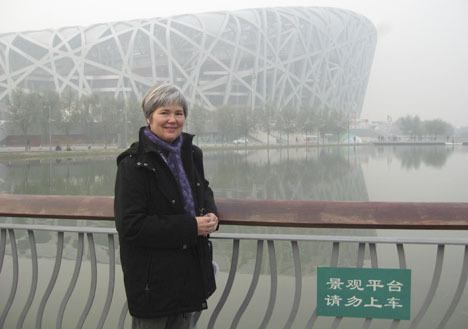Aleta Matteson shares a heartfelt, close connection with China.
Her father lived in Shanghai in the early 1930s when his father, a Marine Captain, was stationed there.
Matteson experienced the country as an impressionable college student while on an art history tour in 1981.
As a single mother, Matteson went to Nanning, China to adopt a 2-year-old girl, Xiao Li, in 1997. Today, Lianna Matteson has blossomed into a 14-year-old girl who excels at Auburn Mountainview High School. One day, Matteson hopes to bring Lianna back to her native land.
“She’s a handful, but she’s also an inspiration,” said Matteson, the proud mom.
China also was the recent destination of a compelling two-week educational and cultural awareness trip for Matteson. The Auburn resident, an English Language Learner specialist at Kent’s Meeker Middle School, was part of a People to People Ambassador Program delegation from the United States that focused on language and literacy.
For Matteson and her colleagues, it was a “trip of understanding,” an opportunity to interact with Chinese teaching professionals and exchange ideas, goals and dreams in today’s evolving classroom. Matteson, the lone representative from the state of Washington, was among a group of 30 teachers, principals, professors and other educators from more than 20 states.
She came away with a greater knowledge of and perspective on an amazing culture and its disciplined classroom system that exists half a world away, gripped by challenges and graced by successes. She came home to describe and share her thoughts with others, including the staff at Meeker.
“I went there in search of the opportunity to collaborate with educators from our country and educators from China, as well as connect with my daughter’s culture,” said Matteson, an extensive world traveler who holds two masters degrees in education and an endorsement in ELL. “I came back with an absolutely fulfilling experience on many fronts.”
Including intense discussions among educators from both sides, different in culture yet similar in nature. Through smiles, gestures and interpreters, they learned a great deal from each other.
“I learned there’s more we have in common,” Matteson said from observing elementary and secondary schools, both public and private, in Beijing, Xi’an and Shanghai. “There’s this sense to do better (in the classroom) and that it is a challenge. It’s not easy.
“(The schools) are pretty rigorous … and the teachers are very committed, very caring,” Matteson added. “There’s pressure (to succeed) … and they’re reaching out to us for more creative ways to teach.”
China, a massive country with the world’s largest population at 1.3 billion, has opened some of its long, tightly-closed doors in the past 20 years. The Communist state has experienced tremendous economic growth and global integration, even if the exploding consumption and the industrial boom have taken a severe toll on the environment.
In the past three decades, the authoritarian state has welcomed foreign tourists, business people and world leaders. It is an old state but a new actor in contemporary international relations.
There is a perception that a once, strongly-isolated China has become more cooperative, perhaps more receptive economically, socially, politically, technologically, artistically … and educationally.
As Matteson can attest, East and West are learning something new in the common classroom.
Some of her observations of the Chinese:
• The children appear happy learners, not just rote-learning memorization students. “Some kids were squirmy, not all were robots,” Matteson said.
• There appears to be more technology in some classrooms, but other schools are devoid of laptops, updated books and other materials. Some schools, Matteson noted, do not provide or emphasize libraries. Students are given more of a choice in book selection within state guidelines.
• The country is concerned that its one-child-per-family policy, meant to control population growth, is breeding a spoiled, selfish generation.
• China isn’t immune to labor woes. Matteson read in one English-language Chinese newspaper where teachers at a private school were waging a strike, unhappy with pay and conditions.
• Teachers are receiving regular training.
• Schools are challenged but have the desire to meet special needs of children.
Matteson said there is an overwhelming energy and pride in the nation to become a harmonious world leader, not just in the classroom but in all facets of society.
“They have high expectations,” she said, and will do whatever they can to reach those expectations.”
Matteson’s tour of schools was interspersed with cultural visits to the Great Wall, seeing the historic Terra Cotta Warriors, jade and rug silk factories, and the Shanghai Art Museum, among other places.
“It was quite memorable to see some of the old European-style buildings in Shanghai that (my father, Clyde) probably saw as a 12-year old,” she said.
Matteson also saw the beauty in its people, leaving a lasting impression.
“The people were very warm and hospitable,” she said. “Mention you’re a teacher, and you’re respected.”



